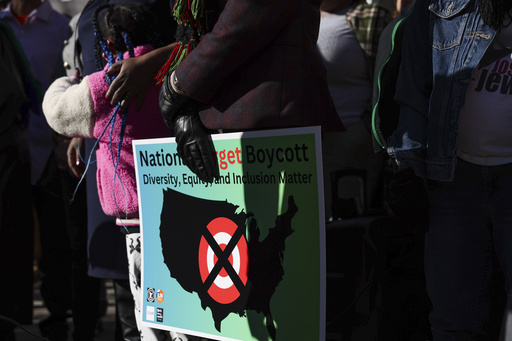
Many major corporations are revisiting or even dismantling their diversity, equity, and inclusion (DEI) programs, which saw a surge in support following the protests triggered by the 2020 police killing of George Floyd in Minneapolis.
This shift has been prompted by a wave of opposition from conservative activists, who have targeted DEI strategies through various channels, including legal avenues and discourse on social media. Additionally, the executive orders issued by former President Donald Trump have further complicated the landscape for DEI initiatives, affecting both public institutions and private enterprises.
DEI initiatives are generally designed to dismantle systemic barriers and facilitate the advancement of historically marginalized groups across different sectors. However, critics argue that these programs can lead to discriminatory practices since they often prioritize candidates based on characteristics like race, gender, and sexual orientation. Consequently, they have challenged corporate sponsorships, employee affinity groups, programs that funnel contracts to minority-owned businesses, and specific targets for enhancing minority representation in company leadership.
Although policies that make hiring or promotion decisions based on race or gender are typically illegal according to Title VII of the Civil Rights Act of 1964, many companies insist they are not engaging in such practices. They argue instead that they aim for a diverse workforce through strategies such as broadening the candidate pool for job vacancies.
Various companies have made notable reductions to their DEI initiatives.
**Goldman Sachs** has announced an end to its requirement that initial public offering (IPO) clients include women and minorities on their boards. A representative for the investment firm stated that the company remains committed to the belief that diverse boards enhance performance, even though it has formally rescinded its board diversity policy. They will maintain a service that connects clients with diverse candidates for board positions.
**Google** has abandoned its earlier goal of increasing the representation of underrepresented groups in leadership by 30% over five years. An internal memo indicated that the company is reassessing its policies in light of executive orders prohibiting what they deem illegal DEI discrimination. Additionally, Google’s parent company, Alphabet, revised its annual report to remove language affirming the company’s commitment to making DEI integral to its operations.
**Target** announced changes to its “Belonging at the Bullseye” strategy, which includes discontinuing a program aimed at supporting Black employees and businesses after George Floyd’s death. This retailer, with nearly 2,000 locations and over 400,000 employees, is also concluding the DEI goals it had established in three-year cycles that focused on enhancing the representation of women and racial minorities in its ranks.
**Meta Platforms**, the parent company of Facebook and Instagram, has also opted to dissolve its DEI program, which had encompassed practices for hiring, training, and vendor selection. They indicated that the reevaluation of such programs was influenced by the Supreme Court’s decision regarding affirmative action in higher education. The company emphasized the need for fair practices that mitigate bias regardless of an individual’s background.
Likewise, **Amazon** has paused multiple DEI initiatives while undergoing a reassessment of its programs. Although specific programs were not detailed, Candi Castleberry, a high-ranking human resources executive, indicated that the company aims to streamline its focus on initiatives with proven outcomes rather than allowing individual groups to create disparate efforts.
**McDonald’s** recently declared that it would stop various diversity initiatives aimed at increasing representation at senior leadership levels, including a program to encourage supplier diversity training. They also stated plans to halt external surveys used to assess their diversity efforts.
**Walmart** confirmed that it would not extend its commitment to a racial equity center established after George Floyd’s killing, nor will it continue its participation in DEI rating systems. They are altering practices related to supplier contracts and no longer gathering demographic data for grant eligibility.
**Ford** outlined a shift in its DEI approach, including ceasing participation in the Human Rights Campaign’s Corporate Equality Index. CEO Jim Farley clarified that while the company does not impose hiring quotas, it remains devoted to fostering an inclusive workplace.
**Lowe’s** has begun reviewing its DEI programs, integrating various employee resource groups into a single organization following the Supreme Court’s ruling on affirmative action. The company will also withdraw from participating in the HRC index and limit sponsorship of external events.
**Harley-Davidson** announced a revamp of its sponsorship practices and intends for all affiliations to require central approval going forward. They will concentrate on activities that align strictly with their business objectives, removing socially-driven training content.
**Brown-Forman**, the company behind Jack Daniels, revealed it would no longer engage with the HRC’s Corporate Equality Index, and will shift its focus regarding diversity efforts tied more closely to business performance.
Finally, **John Deere** mentioned that it would cease sponsoring “social or cultural awareness” events and audit training materials to ensure compliance with laws, while also maintaining a commitment to tracking diversity initiatives. Meanwhile, **Tractor Supply** announced a plan to eliminate its DEI roles and objectives, attributing this decision to a backlash from conservative groups.
As these companies navigate the evolving societal expectations and political pressures regarding DEI, their future strategies will likely continue to transform in response to both internal and external challenges.

